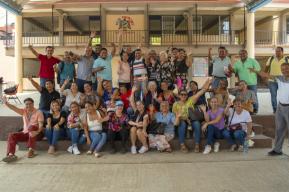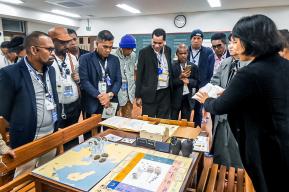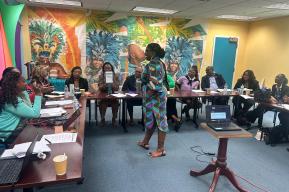News
UNESCO laureate Room to Read Cambodia helps girls stay in school
“We want all girls to grow, to dream and to ultimately change the world,” said Vantha Chea, Country Director of Room to Read Cambodia, one of the two laureates of the 2022 UNESCO Prize for Girls' and Women's Education.
Room to Read, founded in 2000, is rewarded for its Girls' Education Programme which uses life skills and mentoring to transform the lives of girls aged 12 to 18 facing deep inequities in Cambodia. It currently works in five provinces and 40 secondary schools in Cambodia with more than 6,000 girls participating in the programmes. Globally, Room to Read has benefited more than 32 million children in 21 countries.
Caught in a web of inequities
As a result of former conflict and COVID-19, Cambodia currently ranks 144 out of 189 countries in the 2020 Gender Inequality Index. In 2014, while 88 per cent of girls made the transition from primary to lower secondary school, only 1 in 5 of those girls graduated from upper secondary school.
“Not only are children not learning sufficiently,” shared Vantha “but there is ineffective teacher preparation, low quality instruction and many schools have no libraries or teacher resources.”
“Girls face harmful social norms. Often rural communities value their education less and they are not taught life skills to respond to the challenges they face. Once school is finished, they may be forced to work in a factory or the rice fields because the parents want immediate income,” said Vantha.
Learning to make decisions and solve problems
Room to Read's long-term objective is to remove the obstacles that prevent girls from staying in school and to build their ability to make decisions and solve problems themselves.
“In our partner schools, we work with all girls from Grade 7 to 12 who receive support based on their particular needs. This can take the form of stationary, uniforms, shoes, schoolbags and even bicycles for those who are far from school,” said Vantha.
“We also teach life skills through individual mentoring and coaching, based on the national curriculum focusing on self-awareness, self-efficacy and social awareness. This helps build girls’ confidence, empathy, communication, decision-making and problem-solving skills.”
Locally recruited mentors are at the core
Locally recruited women mentors who know the girls, parents, community and local context are able to engage them on a range of topics tailormade for age and stages of schooling. These can include how to set a long-term goal and achieve it or how to negotiate when the family pressures the girl to drop out. Older girls focus on preparing for national exams and career development.
Student Chou Sinit from the Kampong Cham Province in Cambodia wanted to continue in school but, with both her parents out of work, the family couldn’t afford it.
With the help of her mentor, Sinit is now majoring in Information Technology at the National Polytechnic Institute of Cambodia and plans to develop websites to help her community sell crops.
Quality standards, data and partnership combined
Vantha believes the programme is successful thanks to 20 years of experience, strong evidence including feedback from parents, staff and children and partnership.
“Partnership with government is really important. Without effective support, we would not have the impact we have at provincial and school level. We have built trust and they understand what the programme is and how they can support us. We, in turn, align with their strategic goals,” shared Vantha.
Girls and boys must face the challenges together
Room to Read plans to expand in 2022-2023 to reach more than 9,000 girls across Cambodia. It is also working on a pilot life skills programme for boys to teach them about gender inequality. The UNESCO award will help further integrate its work into the education system by training teachers to implement the life skills curriculum themselves.
More information








